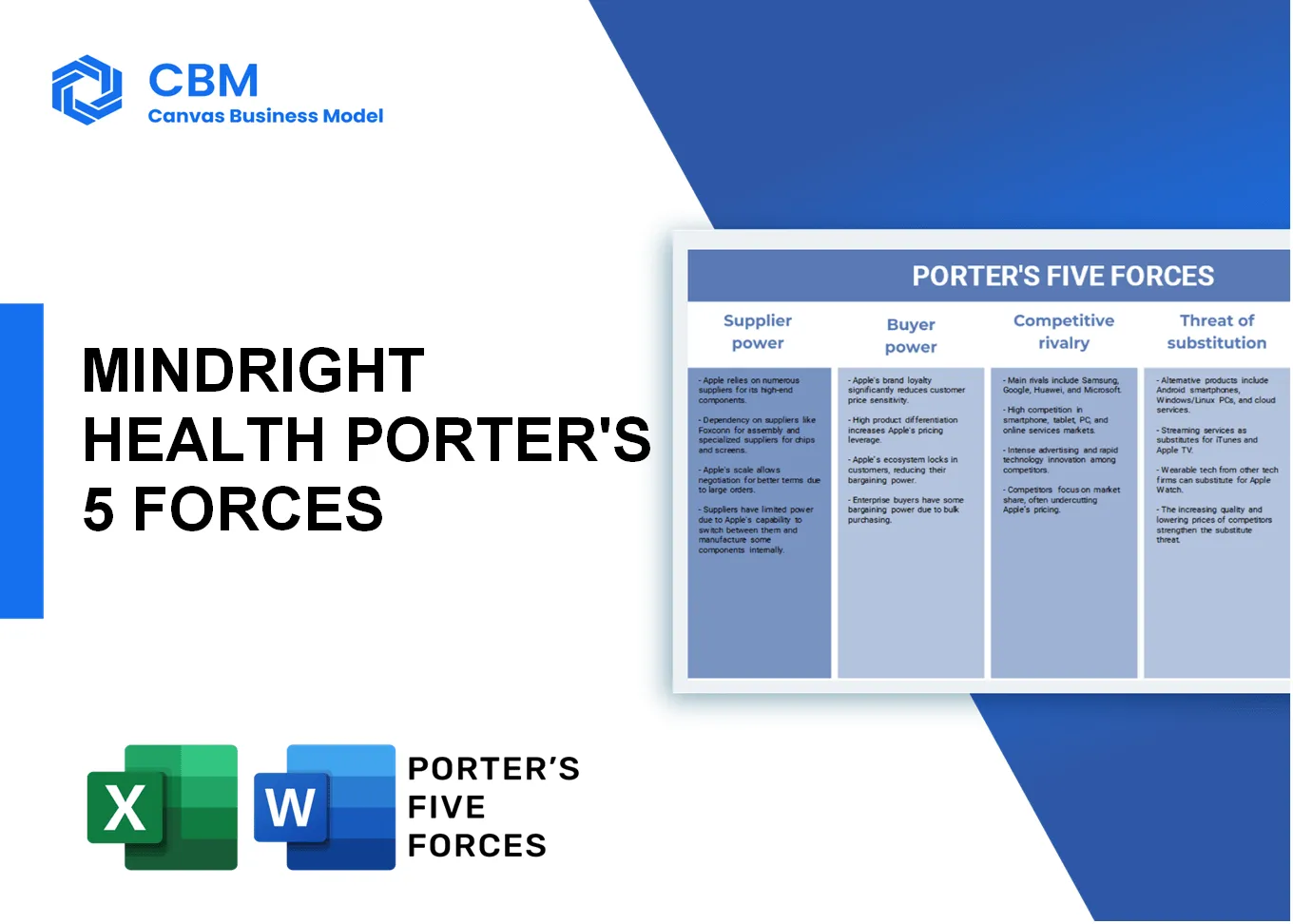In the dynamic landscape of mental health services, understanding the competitive environment is crucial for success. MindRight Health, an innovative provider of culturally-responsive mental health coaching via text, navigates a marketplace shaped by factors outlined in Michael Porter’s Five Forces Framework. Each force—from the bargaining power of suppliers to the threat of new entrants—reveals insights into the challenges and opportunities that define this sector. Explore how these elements influence MindRight Health's strategy and impact the mental health coaching landscape below.
Porter's Five Forces: Bargaining power of suppliers
Limited number of qualified mental health coaches
The pool of qualified mental health coaches is relatively small. According to the American Psychological Association, there were approximately 106,000 licensed psychologists in the U.S. in 2020. With rising demand for mental health services, the number of prospective qualified coaches entering the market is not keeping pace. Only 15% of licensed psychologists specialize in culturally-responsive care.
High demand for culturally-responsive training programs
The demand for culturally-responsive training programs has surged by 30% annually over the past five years, driven by increased awareness of racial and cultural disparities in mental health care. A report from the Health Resources and Services Administration (HRSA) states that minority populations are projected to reach 55% of the U.S. population by 2060, necessitating expanded training programs for coaches.
Potential reliance on technology providers for messaging platform
MindRight Health relies on technology for its messaging platform. The U.S. telehealth market is expected to grow from $25.4 billion in 2019 to $459.8 billion by 2027, indicating increasing supplier influence as technology providers expand their offerings and raise prices.
Supplier switching costs may be low for certain training services
For various training services, the switching costs can be low. A survey by Training Industry revealed that 60% of companies reported being able to find alternative trainers within 30 days. This low switching cost helps maintain pressure on suppliers.
Specialized knowledge in mental health coaching increases supplier power
Specialized knowledge in mental health coaching increases supplier power significantly. In 2022, a report by Burning Glass Technologies stated that job postings for mental health coaches requiring specialized skills had increased by 50% over the last year. This trend indicates that coaches with specialized training are increasingly sought after, enhancing their bargaining power.
Availability of alternative training resources could mitigate supplier power
The availability of alternative training resources can help mitigate supplier power. The global online learning market was valued at $107 billion in 2020 and is anticipated to reach $375 billion by 2026. This expansion means MindRight Health can seek alternative training vendors without excessive costs or delays.
| Factor | Statistical Data | Source |
|---|---|---|
| Number of Licensed Psychologists in U.S. | 106,000 | American Psychological Association |
| Percentage of Psychologists Specializing in Culturally-Responsive Care | 15% | American Psychological Association |
| Annual Growth Rate of Culturally-Responsive Training Programs | 30% | Health Resources and Services Administration |
| Projected U.S. Population Percentage of Minority Groups by 2060 | 55% | Health Resources and Services Administration |
| U.S. Telehealth Market 2019 Value | $25.4 billion | Market Research Future |
| Projected U.S. Telehealth Market Value by 2027 | $459.8 billion | Market Research Future |
| Percentage of Companies Finding Alternative Trainers Within 30 Days | 60% | Training Industry |
| Percentage Increase in Job Postings for Specialized Mental Health Coaches (2022) | 50% | Burning Glass Technologies |
| Global Online Learning Market Value in 2020 | $107 billion | Global Market Insights |
| Projected Global Online Learning Market Value by 2026 | $375 billion | Global Market Insights |
[cbm_5forces_top]
Porter's Five Forces: Bargaining power of customers
Customers have diverse mental health support options
The mental health market has expanded significantly, with over 50% of American adults reportedly having access to various mental health services. According to a 2022 report by Mental Health America, approximately 68% of individuals seeking mental health support are aware of multiple options beyond traditional psychotherapy, including online platforms, apps, and text-based coaching services.
High consumer awareness of mental health services
A 2023 survey indicated that 85% of individuals aged 18-34 are aware of mental health resources available in their area. This awareness contributes significantly to consumers' bargaining power as they are well-informed about what services are offered, leading to greater expectations from providers.
Price sensitivity may vary among target demographics
Consumer price sensitivity varies significantly by demographic. A study from the American Psychological Association in 2022 found that:
| Demographic | Price Sensitivity (%) | Preferred Price Point (USD) |
|---|---|---|
| 18-24 years | 75% | 25-50 |
| 25-34 years | 60% | 50-75 |
| 35-44 years | 50% | 75-100 |
| 45 years | 30% | 100-150 |
Ability to compare services easily online enhances customer power
With the rise of digital platforms, consumers can easily compare various mental health services. According to Google Trends in 2023, the search term 'online mental health services' saw a 200% increase over the past two years. Additionally, platforms such as Yelp and Google Reviews aggregate client feedback, further empowering consumers to make informed choices.
Customers likely seek culturally relevant coaching experiences
According to a report by the American Psychiatric Association, 75% of BIPOC individuals expressed a preference for culturally responsive services in mental health coaching. MindRight Health's focus on cultural competency aligns with this need, reflecting the demand from clients for services that understand their unique backgrounds and experiences.
High potential for word-of-mouth referrals increases client expectations
A study conducted by Nielsen in 2022 revealed that 92% of consumers trust recommendations from friends and family more than any other form of advertising. Moreover, 77% of patients who had a positive experience with a mental health service are likely to refer others. This highlights the influence of client feedback and referrals on the service's reputation and expectation levels.
Porter's Five Forces: Competitive rivalry
Growing number of telehealth and mental health platforms
The telehealth market size was valued at approximately $45.4 billion in 2019 and is projected to reach around $175.5 billion by 2026, growing at a CAGR of 20.5%. The number of telehealth visits increased from 11% in 2019 to over 46% in 2020, demonstrating a significant shift towards virtual healthcare solutions.
Emphasis on culturally-responsive mental health services may create niche
According to a study published in 2021, approximately 40% of minority populations report experiencing barriers to accessing mental health services that cater to their cultural needs. Companies focusing on culturally-responsive services, like MindRight, are positioned to fill this gap in the market, which is estimated to be worth around $26 billion in the U.S.
Potential for traditional therapy providers to enter the text-based market
As of 2021, traditional mental health providers made up about 47% of the U.S. mental health workforce. With an increasing acceptance of teletherapy, these providers represent a significant competitive threat to text-based platforms, as they may leverage their existing client relationships and resources to tap into the text-based service market.
Established competitors may have significant resources and brand loyalty
Companies like BetterHelp, which had revenue of approximately $50 million in 2020, and Talkspace, valued at $1.4 billion post-IPO in 2021, possess substantial financial resources and established brand loyalty. This creates intense competition for MindRight as these platforms have extensive marketing budgets and user bases.
Innovation in service delivery models fosters competitive pressure
The mental health app market is expected to grow to $2.4 billion by 2026, driven by innovations in service delivery models. This includes the integration of AI and machine learning, which enhances user engagement and effectiveness, thereby increasing competitive pressure on companies like MindRight to continuously innovate.
Marketing strategies play a crucial role in attracting clients
The digital advertising expenditure for mental health services soared to approximately $3.3 billion in 2021. Effective marketing strategies can significantly impact client acquisition; platforms with robust online marketing campaigns can attract a larger share of the market, increasing competitive rivalry.
| Company Name | Market Cap (2021) | Revenue (2020) | Growth Rate | Market Segment |
|---|---|---|---|---|
| MindRight Health | N/A | N/A | N/A | Culturally-responsive coaching |
| BetterHelp | N/A | $50 million | Estimated 25% CAGR | Online therapy |
| Talkspace | $1.4 billion | N/A | N/A | Teletherapy |
| Calm | $2 billion | $150 million | Estimated 40% CAGR | Mental wellness app |
| Headspace | $1 billion | $100 million | Estimated 30% CAGR | Mental wellness app |
Porter's Five Forces: Threat of substitutes
Availability of free or low-cost mental health resources (e.g., apps, hotlines)
The mental health app market is projected to reach approximately $3.3 billion by 2025, with an estimated annual growth rate of 23.4% from 2020 to 2025. Numerous free resources exist, including the National Suicide Prevention Lifeline, which reported handling over 2.3 million calls in 2020.
Rising popularity of self-help books and online forums
In 2021, the self-help book industry was valued at around $800 million. According to a survey by the American Psychological Association, 45% of participants reported using self-help resources for mental health. Online forums like Reddit's r/mentalhealth have over 1.3 million subscribers as of 2023, facilitating discussions about mental health.
Potential for online therapy platforms to offer similar services
Online therapy platforms like BetterHelp and Talkspace provide services at rates ranging from $40 to $90 per week, directly competing with services offered by MindRight Health. BetterHelp alone reported connecting over 2 million users with therapists in 2021.
Peer support groups may serve as alternative options
Peer support groups have gained traction, especially during the COVID-19 pandemic. According to a National Alliance on Mental Illness (NAMI) report, 50% of participants found peer support groups beneficial to their recovery. Many organizations, like NAMI, provide free virtual sessions to support mental well-being.
Social media platforms increasingly provide mental health discussions
As of 2023, platforms like Instagram and TikTok have over 1 billion monthly active users collectively sharing mental health content. The hashtag #MentalHealth has over 18 million posts on Instagram, contributing to awareness and alternative discussions on mental health.
Changes in consumer preferences toward holistic wellness practices
The global wellness market is valued at $4.5 trillion as of 2022, with mental wellness being a key component. A 2022 survey indicated that 70% of consumers favor holistic approaches to mental health, including yoga, meditation, and alternative therapies.
| Resource Type | Estimated Market Value ($) | Growth Rate (%) | Participants/Users |
|---|---|---|---|
| Mental Health Apps | 3.3 billion | 23.4 | N/A |
| Self-Help Books | 800 million | N/A | N/A |
| BetterHelp | N/A | N/A | 2 million |
| NAMI Peer Support Groups | N/A | N/A | N/A |
| Instagram Mental Health Posts | N/A | N/A | 18 million |
| Global Wellness Market | 4.5 trillion | N/A | N/A |
Porter's Five Forces: Threat of new entrants
Low barriers to entry in the text-based coaching market
The text-based mental health coaching market presents relatively low barriers to entry, estimated to have a projected growth rate of 23.7% CAGR from 2021 to 2028. Established players typically require minimal physical infrastructure, which lowers initial investment needs.
Technology advancements reduce startup costs for new players
With the advent of cloud-based platforms, the startup costs for new entrants can be as low as $5,000 to $50,000 to develop the necessary applications and technology frameworks. Open-source software solutions and affordable marketing through social media further reduce these costs.
| Technology Cost Components | Estimated Costs ($) |
|---|---|
| Technology Development | 5,000 - 20,000 |
| Marketing and Promotion | 1,000 - 5,000 |
| Operational Setup | 3,000 - 10,000 |
| Legal and Compliance | 2,000 - 15,000 |
| Total Estimated Initial Investment | 5,000 - 50,000 |
High potential for innovative solutions to disrupt industry standards
The mental health coaching sector increasingly features innovative technologies such as AI-driven assessments and personalized messaging. Investments in mental health tech saw a record of $2.4 billion in 2020 alone, highlighting the potential for new entrants to capture market share through innovation.
Niche market for culturally-responsive coaching may attract new entrants
The niche for culturally-responsive mental health services is expanding rapidly, with the U.S. mental health market valued at approximately $240 billion in 2020. This segment is expected to grow due to rising awareness and demand for tailored services.
| Market Segment | Market Size ($ Billion) | Projected Growth Rate |
|---|---|---|
| Overall Mental Health Market | 240 | 4.4% CAGR |
| Culturally-Responsive Services | 30 | 5.8% CAGR |
Established brands may leverage existing customer trust to combat new competition
Companies with strong brand recognition, like BetterHelp and Talkspace, have a cumulative user base exceeding 3 million users. Their established trust can significantly deter new entrants and impact profitability.
Regulatory requirements for mental health services could be a deterrent for some entrants
The regulatory environment demands compliance with standards such as HIPAA, which can incur costs ranging between $50,000 to $150,000 for compliance setup, acting as a barrier for potential new entrants looking to navigate the complexities of mental health regulations.
In navigating the complexities of the mental health landscape, MindRight Health must remain vigilant as it addresses the diverse forces at play. From the bargaining power of suppliers and the myriad options available to customers, to the constant competitive rivalry and the persistent threat of substitutes, every element presents both challenges and opportunities. Meanwhile, the threat of new entrants looms as technology continues to democratize access to services. Ultimately, a deep understanding of these dynamics will empower MindRight Health to not just survive, but thrive in an ever-evolving market.
[cbm_5forces_bottom]












